According to the Centers for Disease Control and Prevention, more than 12 percent of men age 18 and older are in fair or poor health leading to obesity, hypertension and even mortality. Medical professionals from the University of Alabama at Birmingham have provided a few tips to help men get healthy.
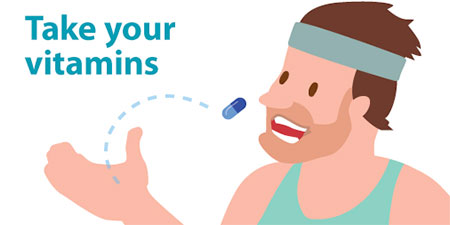 Take the right vitamins
Take the right vitamins
Americans spend more than $20 billion per year on multivitamins, but not every vitamin is appropriate for every person. Identify the health problems you have to better evaluate your daily vitamin needs.
“For the average person, there is no evidence that multivitamins improve health or help one avoid disease,” said William Curry, M.D., professor in the UAB School of Medicine. “There is no proven value of multivitamins unless a man has a known deficiency or specific condition. However, the doses of various vitamins — vitamins A, B complex, C, D and E — in the standard multivitamin products are typically in a safe range.”
Curry recommends a multivitamin for those with malabsorption of the gut, alcoholism, previous gastric bypass surgery, severe kidney disease, on dialysis, or rare metabolic defects. Those who follow a strict vegetarian diet should also consider a general multivitamin.
Antioxidants including Vitamin A, beta-carotene, and vitamins C and E are heavily promoted and advocated; but studies have not found benefit for preventing cardiovascular disease or cancer, according to Curry. Men with higher risk for cardiovascular disease, especially heart attack and stroke, may consider a vitamin with anti-oxidants. However, high doses of Vitamin A can result in fractures and visual problems. Curry warns that high doses of Vitamin E, 400 units per day or more, may cause higher mortality.
“Vitamin E can interact with blood thinners to increase their effects,” Curry said.
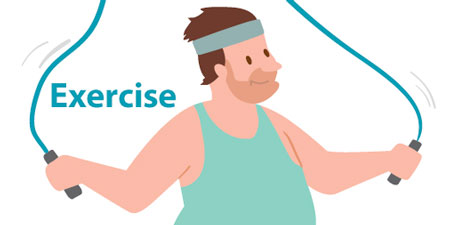 Get moving for heart and brain health
Get moving for heart and brain health
Regular physical exercise is recommended to keep your cardiovascular system and brain healthy. Exercise helps lower blood pressure, improve lipid profile, and better control and possibly prevent Type 2 diabetes, as well as provide a longer life. Multiple studies have shown men who exercise regularly have better erections than men who do not exercise.
“A healthy exercise program keeps the heart, lungs and blood vessels working at their best,” said David Geldmacher, M.D., director of the UAB Division of Memory Disorders. “We recommend two and a half hours of moderate exercise per week, like brisk walking, or lesser totals of more intense exercise.”
Although it represents only about 2 percent of the total body weight, the brain gets about 15 percent of the total blood output from the heart, and consumes 20 percent of the body’s oxygen. Geldmacher recommends keeping the delivery systems working at their best with exercise.
Research studies indicate that persistent exercise triggers hormonal pathways that actually help brain cells increase the number of connections with other cells, as well as strengthen the chemical mechanisms of memory. A combination of resistance or strengthening exercise with endurance exercise is ideal for heart and brain health.
“The time to act is now, while the brain is healthy,” Geldmacher said. “Nowhere in the neurosciences are we able to get the brain to grow new, functioning neurons. However, brain-protective mechanisms, like exercise, get their best shot to work a little bit at a time over long periods.”
Those with medical issues should maintain regular checkups for blood pressure, cholesterol and diabetes using medications as prescribed to keep those numbers in the healthy range, recommends Geldmacher.
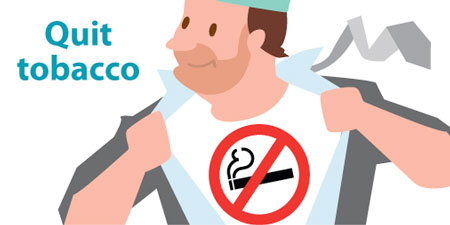 Say goodbye to tobacco
Say goodbye to tobacco
Quitting smoking or chewing tobacco can be very challenging. Kicking the habit can be beneficial for sexual performance, and heart and lung health. It is a preventable driver of mortality through cancer and cardiovascular disease.
“Tobacco is a major cause of damage to the blood vessels that flow to the penis,” said J. Patrick Selph, M.D., assistant professor in the UAB Department of Urology. “If the blood vessels to the penis are damaged, erectile dysfunction may result. Tobacco is also a major cause of cardiovascular disease, and in some cases where the heart or its blood vessels are damaged, a man may be too unhealthy to engage in intercourse.”
Studies have shown that smokers are at a higher risk of having a reduced sperm count and lower sperm motility, affecting male fertility. Side effects are worse in moderate or heavy smokers.
“I always tell my male patients that anything that is heart-healthy is penis-healthy,” Selph said. “One of the major causes of both erectile dysfunction and cardiovascular disease is smoking. In fact, studies have shown that men who have erectile dysfunction are at risk for having a major cardiac event within five years. Quitting smoking is a key tool in the prevention of these problems.”
In addition to the overall issues with tobacco, chewing tobacco poses a risk for throat and next cancer, as well as many dental problems.
“Those who stop smoking will see an immediate impact on their blood pressure with a decrease within minutes, and the toxic levels of carbon monoxide decrease within a day,” said J. Michael Wells, M.D., assistant professor in UAB’s Division of Pulmonary, Allergy and Critical Care Medicine. “Within three months, lung function begins to improve, and the risk of stroke and other cardiovascular diseases will decrease by at least four times.”
Selph recommends a multifaceted approach, including counseling and sometimes medication. The most important thing to kicking the habit is being ready to do so. A few additional tips from Selph and Wells to quit:
- If you are not motivated to quit, you probably will not succeed.
- Set a stop date.
- Get rid of paraphernalia lying around the house such as ashtrays, lighters and cigarettes.
- Avoid stopping at the store where you typically purchased your tobacco products.
- Don’t be afraid to lean on a family member or friend.
- Kick the habit with a friend who is ready to quit also.
- Find a support group.
- Use nicotine replacement products.
“Don’t be afraid of failure,” Wells said. “If you have a relapse, pick yourself up and try again. Cessation for any amount of time is a success. If it were easy, we wouldn’t be having this conversation.”
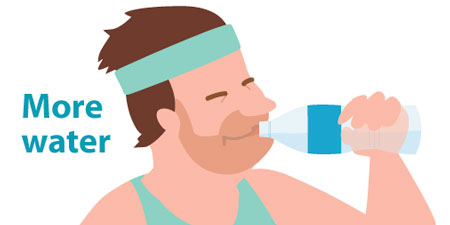 Be cautious of what you are drinking
Be cautious of what you are drinking
Around 11 percent of men will be affected by kidney stones sometime in their lives, and a higher number in the Southeastern United States, also known as the kidney “stone belt.” It is a multifactorial disease influenced by events in the kidney, gastrointestinal system and bone health, certain endocrine disorders, genetics, diet, and environmental factors.
“Warmer climates may cause individuals to perspire excessively, causing them to become dehydrated. This results in urine’s becoming concentrated and the chemicals’ forming kidney stones. Crystals of these chemicals can arise, which is a prerequisite for kidney stone formation,” said Dean Assimos, M.D., chair of the UAB Department of Urology. “The more fluid you consume, the less likely you are to have kidney stones, but it is important to consume the right fluids.”
Assimos recommends drinking 10 to 12 ounces of water every couple of hours while you are awake. If you are exercising or perspiring, drink more due to losing these fluids more rapidly.
Sugary drinks that include high levels of fructose corn syrup, like sodas, should be avoided. Studies have shown a correlation between drinks with high fructose and kidney stones, as well as links between obesity and kidney stones.
“The consumption of coffee, tea, beer and wine in moderate amounts has been associated with reduced risk of developing kidney stones in epidemiology studies,” Assimos said.
UAB nurse practitioner Jody Gilchrist recommends not drinking anything other than water or black coffee. Soft drinks contain sodium and sugar or artificial sweeteners, which may contribute to obesity and diabetes. Carbonation causes calcium to be pulled from bones into the blood stream, which causes osteoporosis and kidney stones. Sports drinks often contain more sodium than you should eat in a day.
“Alcohol is another ‘simple’ sugar and is burned before other calorie sources, more likely to lead to diabetes and obesity,” Gilchrist said. “Alcohol should be limited to one to two servings a day. High amounts of alcohol lead to poor judgment and eating more unhealthy foods.”
Excessive alcohol use can be a cause of sexual dysfunction, because it can lead to decreased testosterone, decreased libido and difficulty getting an erection. It is also important that a man with erectile dysfunction not drink too much alcohol while using certain medications for erectile dysfunction, as the combination can cause an unsafe drop in blood pressure and impair the ability of the medication to work.
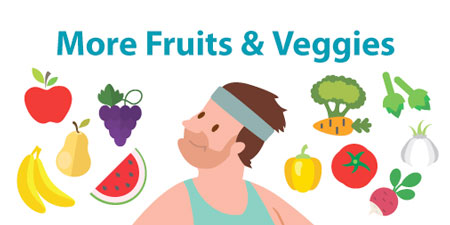 Eat more fruits and veggies
Eat more fruits and veggies
The most important thing a man can do for his overall health is eat a healthy diet. Heart health, diabetes and hormones levels are tied to maintaining a proper diet, including eating the daily recommended fruits and vegetables.
Many of the books and courses for complicated diets have sustained benefit for the average man. Extremely low-fat diets may be dangerous, because the fats are replaced by more carbohydrates, usually simple sugars, which have a variety of bad effects, including Type 2 diabetes.
“Moderate restriction of sodium is a good idea,” Curry said. “Processed foods and snacks are usually loaded with it, as are canned vegetables and soups unless labeled low in sodium. A wise dietitian once said that there are no good or bad foods — just too much or too little.”
He recommends the DASH diet as a reliable model that is affordable and tasty due to its reduction in sodium and variety of foods rich in nutrients. The Mediterranean Diet and its variations also can be worked into a healthy approach to dieting, according to a recent UAB study. Both diets have been associated with maintaining brain health, as well.
The production of testosterone, getting and maintaining an erection, and proper urinary function can also be tied to a healthy diet.
“The best time to start eating a healthy diet is when one is young,” Selph said. “It helps set the stage for eating healthy throughout life, and can prevent problems that come with poor eating choices.”
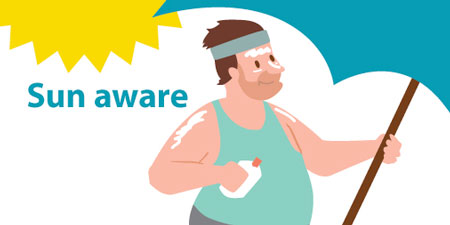 Protect your skin
Protect your skin
Human skin is the body’s largest organ, providing protection to muscles, bones, ligaments and organs. Ultraviolet radiation from the sun directly damages the skin DNA in susceptible people. Over time, this damage can build up, leading to the formation of cancerous cells, which grow into tumors.
Know the types of skin cancer and what they look like to help better identify markings that may have you concerned. Three common types of skin cancer are basal cell carcinoma, squamous cell carcinoma and melanoma.
“Skin cancer, like all types of cancer, is capable of destroying healthy tissue and spreading to distant body sites,” said C. Blake Phillips, M.D., a fellow in the UAB Department of Dermatology. “If undetected or untreated, skin cancers lead to loss of vital functions or death. It is important to keep an eye on your skin and watch for changes that could be a sign of skin cancer.”
The most important aspect of protecting your skin is to avoid UV radiation exposure from the sun. Phillips recommends:
- Wear sunscreen with an SPF value of 30 or higher every day to exposed areas.
- Look for products that don’t feel greasy, and block both UVA and UVB.
- Wear protective clothing and wide-brimmed hats with sunglasses when out in the sun.
- Avoid peak sun hours of the day from 10 a.m. to 5 p.m., choosing to do outdoor activities in morning or evening hours.
- Avoid indoor tanning, and choose pigmented lotion, spray tan or no tan instead.
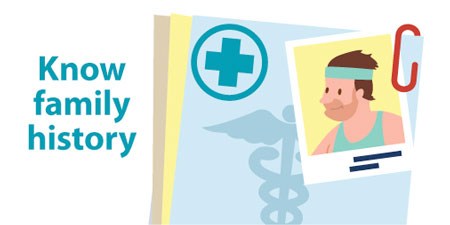 Know your family health history
Know your family health history
Next to skin cancers, prostate cancer is the most common cancer diagnosed in American men. Men age 50 and older should be screened during their annual physical exam with a discussion regarding prostate cancer risk. A routine blood test can measure a biomarker called prostate-specific antigen or PSA, which can identify a man’s risk of prostate cancer along with a digital rectal exam. Concern based on the PSA blood test level or digital rectal exam can prompt a biopsy of the prostate gland, which can be further evaluated to determine the presence of prostate cancer and, if found, the aggressiveness of the cancer.
“Many men do not know their family history of prostate cancer because men tend not to talk about their health concerns, even with their children and other family members,” said Soroush Rais-Bahrami, M.D., assistant professor in the UAB Department of Urology.
“It is important to discuss family history due to the significantly higher risk for men with a first-degree relative who has been diagnosed with prostate cancer.”
Certain men may have a higher risk of prostate cancer based on family history or ethnicity, race, and ancestry and should receive their first screening discussions at the age of 40.